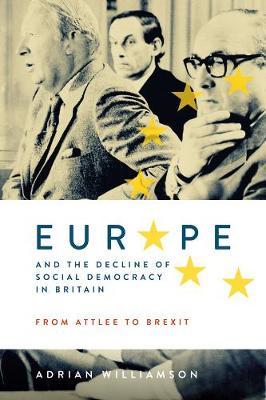Europe and the Decline of Social Democracy in Britain: From

Europe and the Decline of Social Democracy in Britain: From
Since the late 1970s, social democracy in the UK has been in continuous retreat. For the Conservatives, this retreat has been headlong since the rise of Thatcherism in the mid-1970s. Under New Labour, a viable alternative model to Thatcherism was never identified. This mixture of metropolitan social liberalism and freewheeling, finance-based capitalism came unstuck in the crisis of 2007-9. The ostensibly pro-European forces thus came into the 2016 referendum campaign in a very weak state. Tories were, at best, unenthusiastic and many were hostile. Eurosceptic socialists had taken back control of Labour. The forces of social democracy, triumphant in 1975, were beleaguered. It is perhaps not surprising that Remain lost.
This book explores the nation's gradual disenchantment with both social democracy and the EEC/EU, culminating in the 2016 vote for Brexit. It tells the story of the declining fortunes of these two intertwined concepts, for which no one has yet devised any plausible successor project. ADRIAN WILLIAMSON is a QC and practicing barrister at Keating Chambers, London, an Elected Fellow of the Royal Historical Society and the author of Conservative Economic Policymaking and the Birth of Thatcherism, 1964-1979 (Palgrave, 2015).
PRP: 221.00 Lei
Acesta este Pretul Recomandat de Producator. Pretul de vanzare al produsului este afisat mai jos.
198.90Lei
198.90Lei
221.00 LeiIndisponibil
Descrierea produsului
Since the late 1970s, social democracy in the UK has been in continuous retreat. For the Conservatives, this retreat has been headlong since the rise of Thatcherism in the mid-1970s. Under New Labour, a viable alternative model to Thatcherism was never identified. This mixture of metropolitan social liberalism and freewheeling, finance-based capitalism came unstuck in the crisis of 2007-9. The ostensibly pro-European forces thus came into the 2016 referendum campaign in a very weak state. Tories were, at best, unenthusiastic and many were hostile. Eurosceptic socialists had taken back control of Labour. The forces of social democracy, triumphant in 1975, were beleaguered. It is perhaps not surprising that Remain lost.
This book explores the nation's gradual disenchantment with both social democracy and the EEC/EU, culminating in the 2016 vote for Brexit. It tells the story of the declining fortunes of these two intertwined concepts, for which no one has yet devised any plausible successor project. ADRIAN WILLIAMSON is a QC and practicing barrister at Keating Chambers, London, an Elected Fellow of the Royal Historical Society and the author of Conservative Economic Policymaking and the Birth of Thatcherism, 1964-1979 (Palgrave, 2015).
Detaliile produsului








